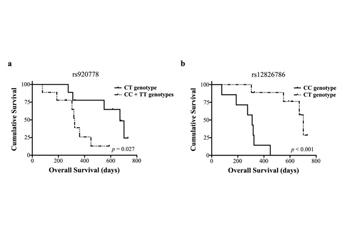Associação Portuguesa de Investigação em Cancro
Polimorfismos do HOTAIR têm implicações no prognóstico de pacientes com glioma
Polimorfismos do HOTAIR têm implicações no prognóstico de pacientes com glioma

A expressão alterada do RNA longo não-codificante HOTAIR tem sido implicada na agressividade de diversos tipos de tumores, incluindo o glioma, o tipo de tumor primário maligno mais frequente do cérebro. Os polimorfismos de nucleótido simples (SNP – do inglês single nucleotide polymorphisms) no gene HOTAIR têm sido associados com o risco de desenvolver diversos tipos tumorais, mas o seu papel em gliomas era desconhecido. Neste estudo de caso-controlo, usando amostras de 177 pacientes Portugueses com glioma e 199 controlos sem cancro, nós mostramos que as variantes genéticas dos polimorfismos rs920778 (C>T) e rs12826786 (C>T) não conferem risco para glioma. No entanto, os nossos resultados demostram pela primeira vez que a variante genética CT em ambos os polimorfismos se associa com uma maior sobrevida dos pacientes com oligodendroglioma anaplásico (grau III da OMS). Assim, estes SNPs parecem ser importantes factores de prognóstico dos pacientes com oligodendroglioma anaplásico.
Autores e afiliações:
Ana Xavier-Magalhães1,2*, Ana I. Oliveira1,2*, Joana Vieira de Castro1,2, Marta Pojo1,2, Céline S. Gonçalves1,2, Tatiana Lourenço1,2, Marta Viana-Pereira1,2, Sandra Costa1,2, Paulo Linhares3, Rui Vaz3, Rui Nabiço4, Júlia Amorim4, Afonso A. Pinto5, Rui M. Reis1,2,6, Bruno M. Costa1,2
1Life and Health Sciences Research Institute (ICVS), School of Health Sciences, Campus de Gualtar, University of Minho, 4710-057 Braga, Portugal;
2ICVS/3B’s - PT Government Associate Laboratory, Braga/Guimarães, Campus de Gualtar, University of Minho, 4710-057 Braga, Portugal; 3Department of Neurosurgery, Hospital S. João, Porto, Portugal;
4Department of Oncology,
5Department of Neurosurgery, Hospital de Braga, Braga, Portugal;
6Molecular Oncology Research Center, Barretos Cancer Hospital, 1331 Barretos-SP - CEP 14.784-400, S. Paulo, Brazil
* These authors contributed equally for this work.
Abstract:
Abnormal expression of the long non-coding RNA HOX transcript antisense intergenic RNA (HOTAIR) is oncogenic in several human cancers, including gliomas. The HOTAIR single nucleotide polymorphisms (SNPs) rs920778 (C>T) and rs12826786 (C>T) present in the intronic enhancer and promoter regions of HOTAIR, respectively, are associated with expression, cancer susceptibility, and patient prognosis in some tumor types. However, the relevance of these HOTAIR SNPs has not been studied in glioma. Here, we report a case-control study comprising 177 Portuguese glioma patients and 199 cancer-free controls. All subjects were genotyped by PCR and restriction fragment length polymorphism (RFLP). No statistically significant differences were found in the genotype or allele distributions of either rs920778 or rs12826786 between glioma patients and controls, suggesting these SNPs are not associated with glioma risk. No significant associations were found between rs920778 variants and HOTAIR expression levels, while rs12826786 CT genotype was associated with increased intratumoral HOTAIR RNA levels when compared to TT genotype (p-value = 0.04). Univariate (Log-rank) and multivariate (Cox proportional) analyses showed both rs920778 CT and rs12826786 CT genotypes were significantly associated with longer overall survival of WHO grade III anaplastic oligodendroglioma patients. Our results suggest that HOTAIR SNPs rs920778 and rs12826786 do not play a significant role in glioma susceptibility, but may be important prognostic factors in anaplastic oligodendroglioma patients. Future studies are warranted to validate and expand these findings, and to further dissect the importance of these SNPs in glioma.
Revista: Journal of Neuro-oncology




